The Men Who Made Liverpool: Walter Wadsworth – Bootle’s fearless fighter, joker and skilful half-back

Continuing his series telling the stories of the men who made Liverpool, Jeff Goulding speaks to those closest to one of the key players of the 1920s, Walter Wadsworth.
Walter Wadsworth was a tough-tackling half-back who played in one of the finest Liverpool teams of all time. Part of the famous ‘Untouchables’ of the 1920s, he was a skilful defender, not afraid to get stuck in when needed and a joker off the pitch. More than that, he was a thinker about the game and a principled man. However, Walter’s rise to prominence was a difficult one. With key insights from his son, Bill, and granddaughter, Jacqueline, we tell his story.
Born into a working-class family in the Merseyside town of Bootle in 1890, Waddy—as he became known—was the sixth of nine children. He was brought up by his parents, surrounded by his four brothers and four sisters. Life would have been tough for the family, not least because Walter’s mother suffered from mental illness, something the children would have lived with for a number of years before she was eventually taken away to Rainhill Asylum in 1906. There she would remain until her death in 1920.
Bootle was a place of contrasts in the late 19th century and early parts of the 20th century. Alongside the vestiges of prosperity lay poor housing, squalor and misery.
Originally a seaside resort for wealthy merchants in the early part of the 19th century, the growth of the docks and railway saw Bootle rise into a prominent centre of commerce. Today, its town hall still stands as an example of its Victorian splendour and its significance as a centre of economic power in the region. The area would even elect a future Conservative prime minister, Bonar Law, to parliament in 1911.
However, life for families who relied on the docks for their living would have been very different. Living conditions in the terraced houses close to the waterfront were cramped, especially for large families. Many were used to going hungry, particularly as work was casual and precarious. Walter’s granddaughter, the historian and writer Jacqueline Wadsworth, believes that her family were luckier than most.
“They grew up on the terraced streets of Bootle (addresses included Cowper Street, Hemer Terrace, and Brook Road) in houses that must have felt pretty cramped for a family of that size. At the turn of last century when Walter was growing up, times were difficult economically—especially in Bootle where dockers’ families often went hungry,” she told This Is Anfield.
“But I don’t think the Wadsworth family was touched by poverty because, despite fairly humble beginnings, Walter’s father was determined to make a success of himself. Beginning life as a railway labourer, then an iron planer, he went on to start up a coal merchants business, and ended up running the Wadsworth Lighterage and Coaling Company, which had its own fleet of barges which were used to refuel ships in the Mersey. He was also a Bootle councillor.”
Young Walter was therefore a middle child in a large family. He lived in a tough neighbourhood and his father would undoubtedly have been working long hours, leaving the older children to take care of the home. Walter’s sister Alice would become the Wadsworth matriarch and Walter was very close to her. However, the trauma of his mother’s illness and subsequent hospitalisation would surely have cast a long shadow. Jacqueline believes these early experiences helped shaped the man who became a Liverpool legend.
“These circumstances, and the fact that Walter grew up in the middle of a large family—neither one of the oldest nor youngest—meant that he had to learn how to look after himself and make his voice heard,” Jacqueline continued. “I’m sure this influenced the man, and the football player he became—he was certainly no shrinking violet!”
By 1912, Walter—who had been working for his father’s business—was now 22 years of age. He had developed a keen interest in football and played for local amateur sides Lingdale and Ormskirk. It was while featuring for the latter that he began to attract interest from Liverpool Football Club, who were managed by Tom Watson at the time.
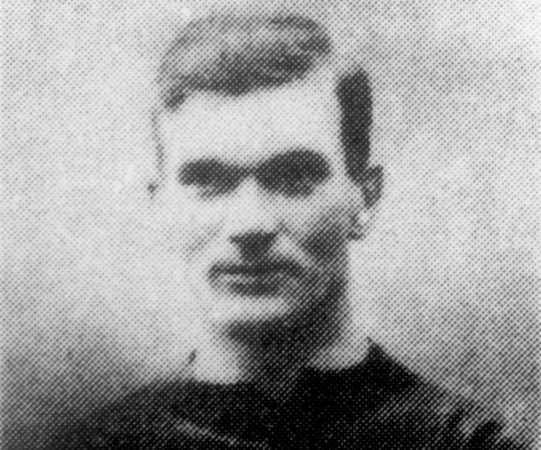
The club signed him in April 1912, just over a month before the sinking of the Liverpool-registered Titanic in the North Atlantic with the loss of over 2,000 people. The headquarters of the Cunard shipping line—from which news of the disaster was announced to waiting crowds who had gathered outside—was in James Street, just 0.3 miles from where Walter and his family lived. They would have undoubtedly been caught up in the shock and grief at the terrible loss of human life.
These were also turbulent times politically, for the region and the country. Centre stage in Liverpool was a general transport strike, involving dock workers and others, which took place a year earlier in 1911. It led to mass demonstrations and the army and navy were dispatched to the city to quell what the government feared would be a revolution. The conflict culminated in the military charging demonstrators at Lime Street, an act that resulted in widespread rioting. In the Vauxhall Road area of the city two dock workers were shot dead by soldiers after trying to release their comrades from a police wagon. The Wadsworth family lived in the epicentre of this upheaval.
Liverpool FC, having won the league title in 1901 and 1906, were a fading force by this stage. They would finish the 1912/13 season in 12th place, level on points with neighbours Everton who were 11th by virtue of goal average. It was now 20 years since the boardroom split had led to the creation of Liverpool FC, yet by all accounts the acrimony between the two clubs was showing little signs of settling down. Games between the two sides would be fiercely competitive and it is not hard to imagine the rivalry between supporters being similar.
Walter would wait three years for his debut, which was a 3-0 defeat away to Middlesborough in March 1915. He’d have been 24 years of age, and playing alongside footballers he may well have watched from the terraces. In goal for Liverpool that day was the great Elisha Scott, a man with whom Walter would develop a great friendship.
That would prove to be his only appearance in a season in which the Reds finished 13th and rivals Everton won the title. The Football League was suspended the following year due to the outbreak of the Great War and Walter would not feature in an official match until 1919. He was not called up, probably because he was in a reserved occupation. As well as playing football, he also worked as a stevedore, loading and unloading ships at the docks. However, it is known that his older brother Arthur, also a footballer, did serve and spent more than two years in a German prisoner-of-war camp.
Walter played 114 games for Liverpool in unofficial games during the war years, scoring nine goals. Jacqueline feels that it was during these games that he developed his reputation as a tough player willing to mix it up when needed. She cites a report written in 1916, which refers to Walter’s attributes:
“This tall young fellow is one of the few locals capable of keeping his place without a ‘back scratcher’, and the day is not far distant when he should figure regularly in a senior side.”
When the war ended the man who had signed Walter, Tom Watson, had sadly died. In his place was George Patterson who, while a talented secretary for the club, had not enjoyed much success in the league. He would decide to focus solely on administration in December 1919, making way for Dave Ashworth, who had managed Oldham and Stockport County.
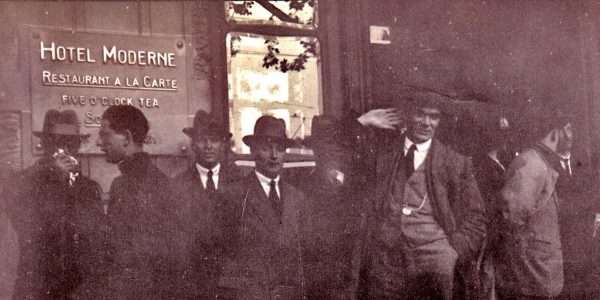
Ashworth would have seen in Wadsworth an experienced and talented player well suited to the physical demands of the league. By now Walter was 28 years of age and a married man. He would become a virtual ever-present in the team from that moment on. However, he wasn’t the only Wadsworth to play for the club.
“Walter’s two younger brothers, Charles and Harold, were also footballers and between 1919 and 1920 all three Wadsworth brothers were at Liverpool,” Jacqueline explains. “Charles played for the reserves, making his first appearance in 1918, but progressed no further, probably due to business calls in connection with his father’s company. Harold, the youngest of the Wadsworth clan and eight years Walter’s junior, played for several clubs including LFC from 1919 to 1924.
“Walter always referred to Harold as ‘our kid’ and this familiarity was picked up by the fans who would cheer ‘go on our kid!’ when Harold took off down the wing. Likewise, if the brothers were in a match together and an opposing player made a nasty tackle on Harold, the fans would apparently urge Walter to take retribution: ‘Get him Waddy!’. Walter was close with his brothers (Charles was best man at his wedding and an older brother, Frederick, moved in with Walter’s family when his own wife died) and my father remembers that Walter’s brothers looked up to him.”
By now the ‘Untouchables’ side was beginning to gel together. Another local lad, Tom Bromilow, would rise to prominence and in turn would become a great friend of Walter’s. Waddy was now surrounded by great players, and by the end of the 1920/21 season they had scrapped their way to fourth place. However, their best was yet to come.
As well as being great performers on the pitch, they had knitted together well off the field of play. This was a first XI full of internationals, huge characters and fierce competitors, and none more so than Walter. His son grew up hearing the many stories of his father’s exploits and the camaraderie in the dressing room.
“Walter was a popular, gregarious and colourful character, well-known for his sense of humour. His practical jokes were part of my childhood and I still think of them with a smile. Walter’s sense of fun is often mentioned in old newspaper articles about him,” Bill told This Is Anfield. “We have an old family photograph of Walter shaking hands with King George V one chilly March day in 1920 when Liverpool were playing Man City at Hyde Road. ‘You wouldn’t have a bottle in your pocket?’ ventured Walter as he shook the king’s hand. A box of scotch was duly sent to players’ dressing room at the end of the game!”
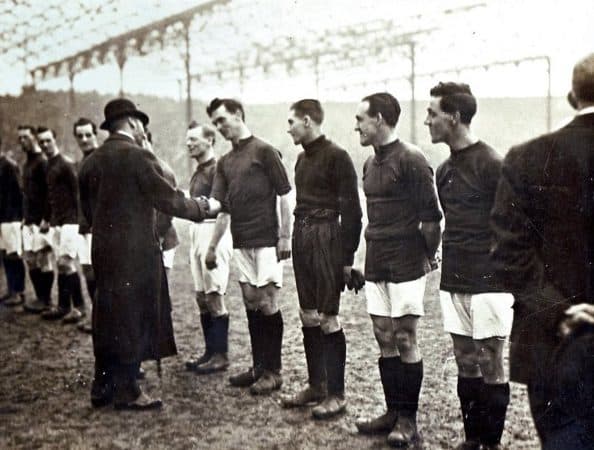
This was a player who clearly didn’t stand on ceremony and who was undaunted by authority figures. His sense of irreverence and humour was obviously endearing and he would have been a huge favourite among his team-mates and supporters alike. However, he was a man of many sides. His family say he could also be a no-nonsense type, even describing him as brusque. Clearly, he didn’t allow what others thought of him to affect his judgement.
“If he didn’t want to sign autographs then he wouldn’t. If someone was shouting abuse at him on the pitch, he wouldn’t stand for it. This led to a famous incident at Sheffield in 1923 when he punched someone in the stands for doing just that. He then wrote a very articulate letter to the Topical Times explaining why he threw the punch—it wasn’t gratuitous—and justifying his actions. Although he could come across as aggressive, Walter was a man of principle and had standards,” Jaqueline recalls.
“He didn’t crave the status bestowed by international caps or captaincy. However, he was happy to accept responsibility or leadership when it came his way, whether he was given the role of captain, asked to deliver a speech or present awards at the club, or to make a stand for others to follow.
“A former referee, writing a column in 1938, recalled a particularly bad-tempered match between Liverpool and Everton, he wrote: ‘Then it came. One of the Liverpool players went down like a log. It was Walter Wadsworth—a player with a heart as big as a lion! I went to him, as he lay writhing on the ground, and waited until he had recovered, and then said “Walter my boy—what about it?” Realising that I had cautioned the player who had kicked over the traces, Walter turned to his pals, and in a voice loud enough to be heard by most of the opposition too, said: ‘Now lads, let’s play football, this mucking-in will get us all sent to the tent!’ After this both teams settled down and I firmly believe that Walter Wadsworth was one of the men of the old days to break up the feud that for some years existed at Anfield and Goodison.’”
Liverpool would clinch their first league title in 16 years in 1922, winning 22 of their 42 games and drawing 13. They would only taste defeat twice at Anfield all season. Walter was a pivotal part of that championship-winning team. They would concede only 36 goals and managed 18 shutouts. He would then help his club earn the honorific of ‘Untouchables’ by securing back-to-back league titles in 1923.
By this stage Walter was 32 years of age and his career at Liverpool had just two years left to run. However, there was time for one more controversial episode. In a moment that perhaps epitomises Wadsworth’s toughness and his refusal to be disrespected by anyone, Walter was banned by the FA after an incident during a game against Newcastle at Anfield in 1925.
The incident took place on Valentine’s Day in front of a crowd of 33,000, and there was very little love in the air. The game was a bad-tempered affair that somehow ended 1-1. Liverpool went down to 10 men after Jock McNab was sent off, but that wasn’t the end of it. Just a few minutes later, the Geordies’ Tommy Urwin threw mud in Walter’s face. It was a huge mistake because Waddy immediately punched his opponent in the face. He would miss the remainder of the season and left for Bristol City in 1926, where he took up the reins as captain. He was 36 years old.
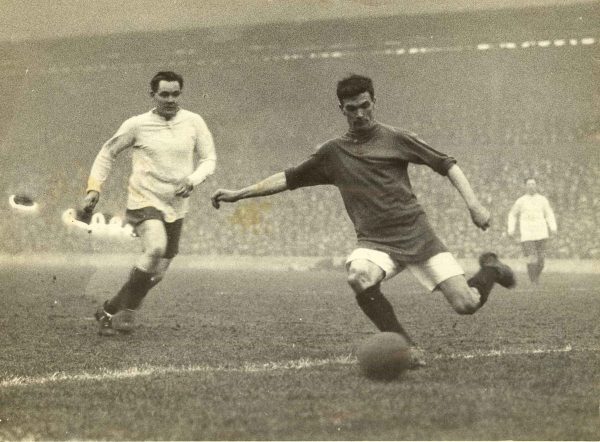
He spent two years at the club, managed by former Reds captain Alex Raisbeck, and was widely credited with the side’s promotion to the Second Division in 1927. Walter went on to play before playing at a lower level for Flint Town (as player/manager), New Brighton and Oswestry. When he eventually hung up his boots in 1931, he would have been 40 years of age.
His legacy is a complex one. It would be simplistic to describe him as a purely a tough-tackling centre-half. That would do him a disservice. His granddaughter Jacqueline concurs and argues he deserves more credit than that.
“On the field Walter was well known for his ‘take-no-prisoners’ style of play which reflected his motto: ‘Ball may pass me but man never!’. But underlying his crunching tackles was skill that prompted Sunderland and England player Charles Buchan to describe Walter as the most difficult half-back he had faced: ‘You never know what he’s going to do next. He’s so unorthodox and seems to “get there” without disclosing his intentions’,” explained Jacqueline.
“And this sums up the dichotomy in Walter’s character. It’s easy to caricature him as simply the original hard man from Bootle who wasn’t afraid to put the boot in…but there was far more to him than that. Football obviously meant a great deal to him. But it wasn’t just the game he loved, it was the life too, and the team spirit.”
Bill agreed: “Dad didn’t talk much about the football or winning, it was the players he remembered, especially Jock McNab, Elisha—who could be as brusque as he was—and Tom Bromilow, whom he remembered with a lot of affection. They were all great friends.
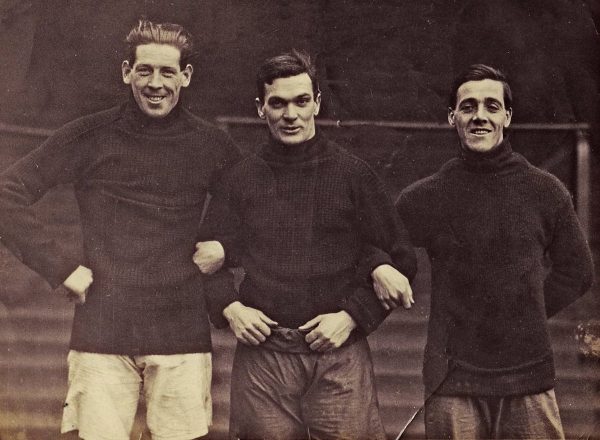
“Walter and Elisha were very good buddies, having both signed for the club as young men in 1912. They obviously had fun together and in many ways they were cut from the same mould: neither suffered fools gladly and they shared a sense of humour.
“On the field Walter and Elisha would always look out for each other, providing cover when necessary. They were similar players in that neither gave any quarter, nor did they expect favours. I was amused to read that after Walter left Liverpool, a defender named Jimmy James wasn’t quite as at ease with Elisha as Walter had been, apparently he couldn’t stand the foul language Scott used, not only to the opposition but also towards his own players!
“Back then, the players didn’t earn much so there were no distractions, no celebrity. First and foremost they were a team and they wanted to win for their club. It’s as simple as that.”
Walter Wadsworth served Liverpool Football Club from 1912 to 1926. He played 242 times for the club, a figure that surely would have been much higher if not for the war. He played more than a 100 times between 1914 and 1918. This was an accomplished centre-half, who grew up on the streets of Bootle and won two league titles for Liverpool. He was one of the ‘Untouchables’ and he was one of the many unheralded men who made Liverpool.
















